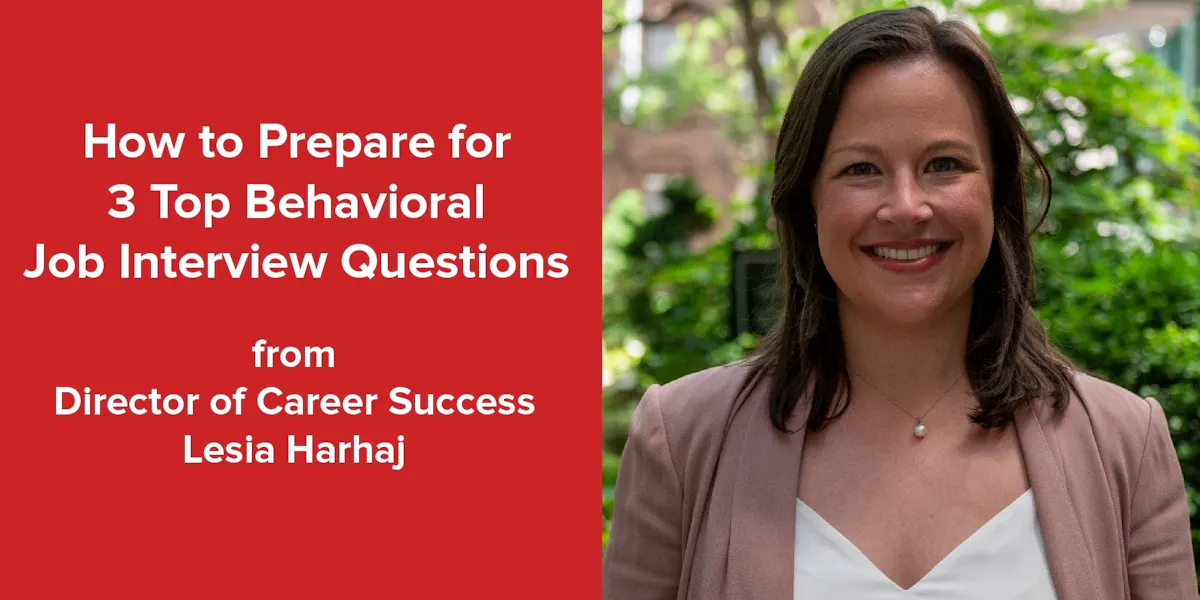Fill out the form to get more information about the Fullstack Academy bootcamp of your choice.
10.27.2022
How to Prepare for 3 Top Behavioral Job Interview Questions
By Emily Gregor

As Fullstack continues to host events and classes virtually, we want to ensure that we’re continuing to support the next generation of software developers by providing valuable tools and resources.
Our Fireside Chat series on YouTube (subscribe to our channel so you don’t miss out), hosted by co-founders and co-CEOs David Yang and Nimit Maru, offers career advice, job-seeking tips, and more.
The latest video features a conversation between David and Fullstack’s Director of Career Success, Lesia Harhaj, about how to prepare for three of the top behavioral interview questions.
While Fullstack's curriculum and Career Success team will get you prepared for all kinds of technical interview questions, our team also wants you to succeed in the behavioral portion of the interview, which every company from FAANG to startups will have too.
Whether you’re a current student, a recent bootcamp grad, or well into your coding career, the three tips below will help you succeed in any interview.
Must-Know Interview Question #1: Why This Role?
This question is probably the most important one.
“It is like dating. People want to know that you’re invested,” Lesia says. When it comes to answering this question well, she recommends finding something about the company that resonates with you, whether that’s the mission, projects the company has worked on, or the company’s values.
Many of our students find value in companies that provide mentorship and focus on community and culture.
“We’ve seen a lot of our Fullstack Academy students go to work at companies where our alums have been hired,” Lesia says. “It’s great to see that support, and that’s something that they highlight during their interview process.”
Must-Know Interview Question #2: Why Bootcamp?
Employers want to get to know you, and understanding your educational journey is part of that.
“I think when employers are asking that question, they want to know how self-aware a student is,” Lesia says. “They want to understand why you wanted to make a pivot—you might have been leaving an industry, you might have been leaving a steady job—they want to understand what your thought process was.”
She encourages students to think about what they wanted to get out of attending a bootcamp (and you can apply this to other educational experiences too) over another option.
“The first thing we like to highlight is that it shows commitment to the field—they’re focused on being an engineer at this stage in their career,” she says. “We also see students talk about how bootcamp education has really sped up their process of being able to solve technical problems.”
This identifies that you’re skilled at problem-solving and that you’re invested in your own success.
David notes that showing excitement for software development and the projects you’ve created can make a big difference as well.
“You can sometimes bring back that … appreciation for how cool this field is and how lucky we are to be alive in this time,” David says. “I think having that excitement is something programmers can really key into.”
Must-Know Interview Question #3: How Do You Deal With Conflict?
When employers are building out their team, they want to understand how you handle conflict to see what you have to offer as a teammate.
“You’re not going to agree with everyone all the time on projects and problems that you’re working on,” Lesia says. “Employers really want to dive deep into understanding [if you’re] going to be someone who can identify conflict and then figure out ways to reconcile it so the team and the project can move forward.”
Students at Fullstack typically bring up the group projects they work on throughout the immersive. “They have to work together not only to identify the idea that they’re going to be working on but how they’re going to build it and who’s going to do what,” Lesia says.
The main thing to focus on when answering this question is how you collaborate and how you move forward when you encounter conflict.
Now that you’ve learned how to master three of the top behavioral interview questions, hear Lesia’s eight tips and tricks for doing well in a virtual interview.


